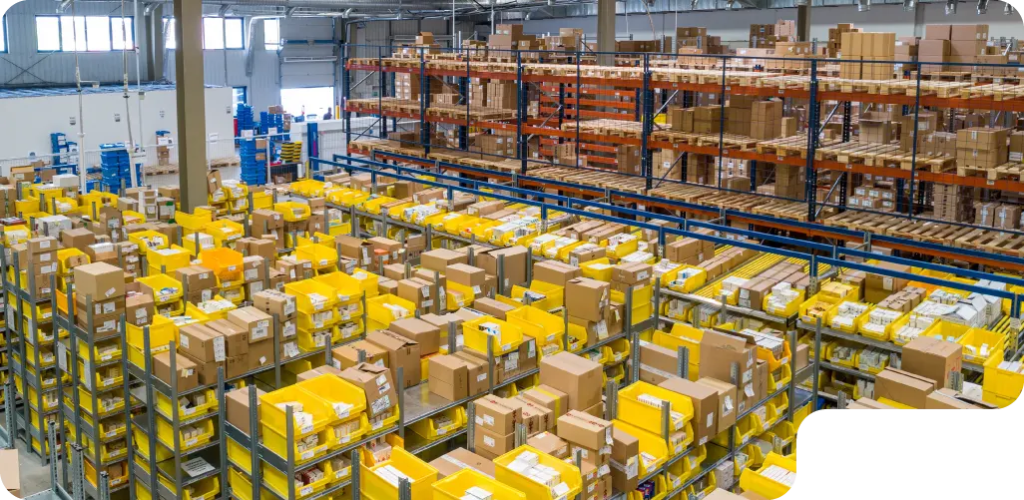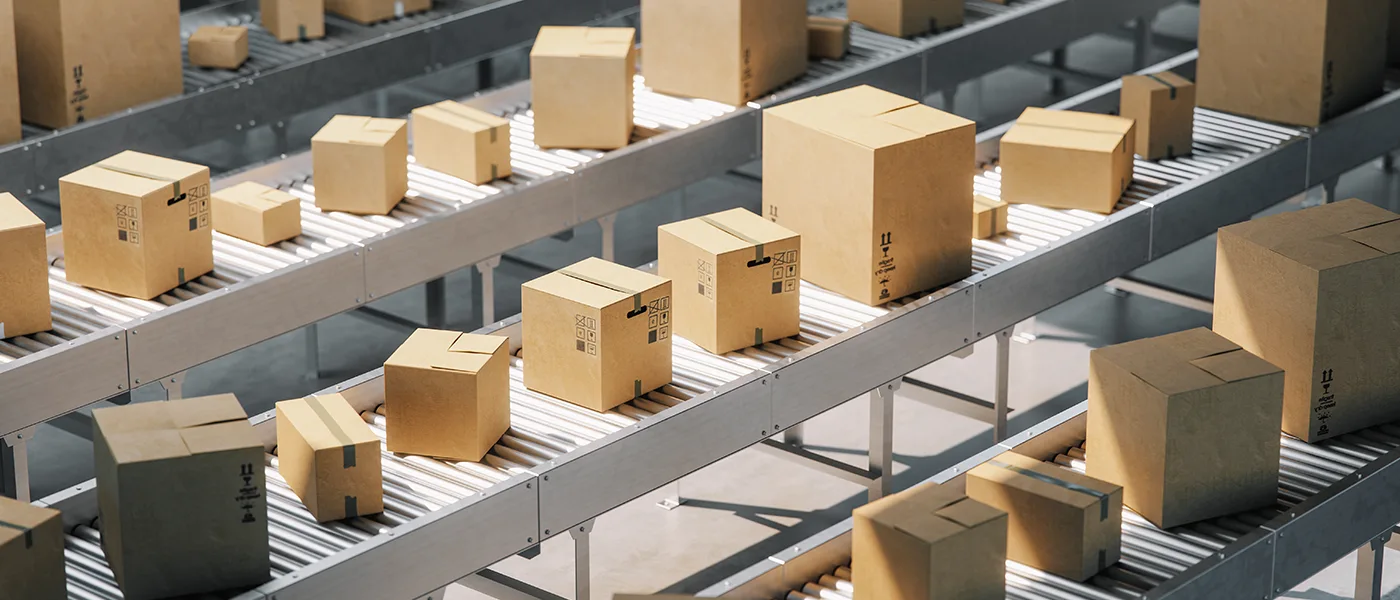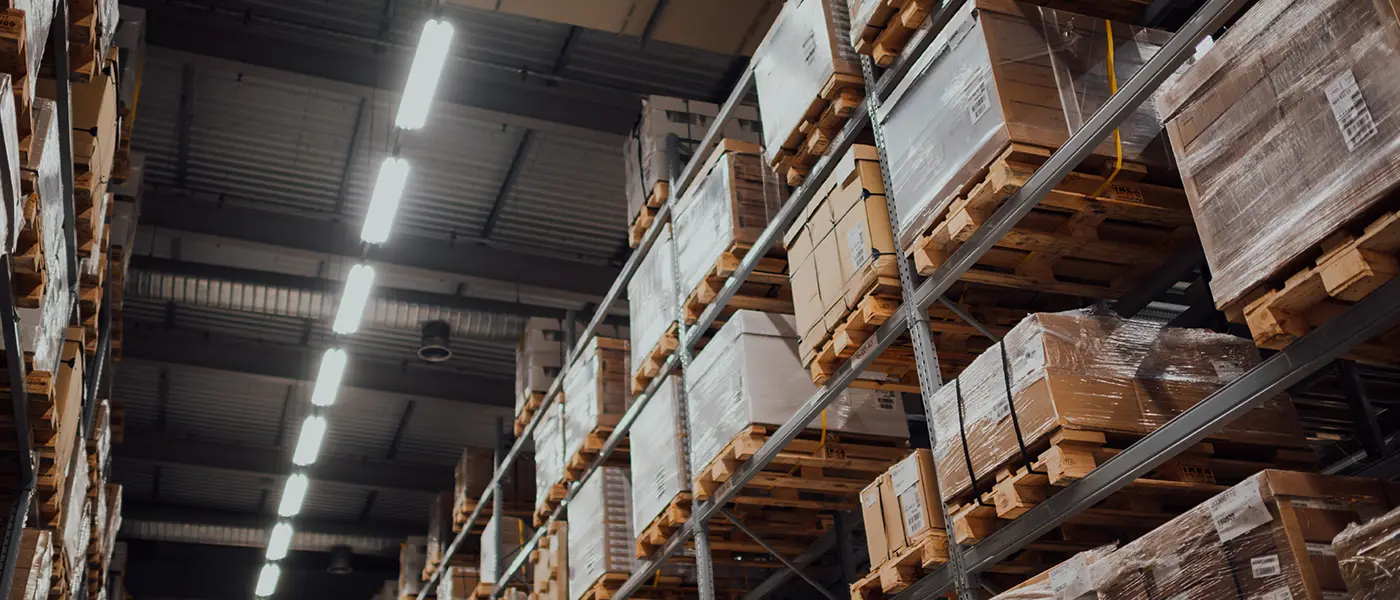Contract logistics plays a vital role in the success of e-commerce businesses. It involves outsourcing various logistics functions to a specialised service provider, enabling companies to streamline their supply chain operations and focus on their core competencies.
In this guide, we will delve into the fundamentals of contract logistics, its benefits, and its significance in the evolving e-commerce landscape.
Whether you are a small online retailer or a large enterprise, understanding contract logistics is crucial for optimising your fulfillment processes and achieving operational efficiency.
Let’s explore the key aspects and considerations that can help you make informed decisions when it comes to contract logistics partnerships.

What is Contract Logistics?
Contract logistics, or third-party logistics (3PL), refers to the outsourcing of logistics operations to a specialised service provider. These providers, known as contract logistics companies, offer a range of services that span the entire supply chain, including inventory management, order fulfillment, transportation, warehousing, and value-added services.
Contract logistics has become increasingly prevalent in the e-commerce industry, with businesses recognising the benefits of leveraging the expertise and infrastructure of external logistics partners. According to recent industry reports, the global contract logistics market is projected to grow at a real 2020-2025 CAGR of 5.1%, and by 2025, the market will be 24% larger than before COVID-19.
By partnering with a contract logistics provider, e-commerce businesses can optimise their supply chain operations and improve overall efficiency. These providers bring specialised knowledge, experience, and resources to handle logistics complexities, ensuring smooth and timely order fulfillment.
In the next sections, we will explore the key factors to consider when choosing a contract logistics partner, the scope of services they offer, the benefits of contract logistics, and its role in the evolving e-commerce landscape.
Understanding the Scope of Contract Logistics Services
Contract logistics providers offer comprehensive services to support and optimise various aspects of your e-commerce business’s supply chain.
Understanding the scope of these services can help you determine which areas of your logistics operations can be outsourced to a contract logistics partner. Here are the key components of contract logistics services:
Inventory Management
- Contract logistics providers excel in efficiently managing inventory on behalf of e-commerce businesses.
- They handle inventory tracking, stock replenishment, and optimisation to ensure adequate stock levels while minimising storage costs.
- Advanced inventory management systems and technologies are utilised to maintain accurate and real-time visibility of stock levels.
Order Fulfillment and Processing
- Contract logistics providers streamline the order fulfillment process, from receiving customer orders to packaging and shipping.
- They have the infrastructure and expertise to handle order picking, packing, labelling, and preparing shipments for delivery.
- Efficient order processing ensures timely and accurate fulfillment, enhancing customer satisfaction.
Transportation and Delivery Solutions
- Contract logistics partners have established transportation networks and relationships with shipping carriers.
- They handle the transportation and delivery of products to domestic or international customers.
- The logistics provider selects the most cost-effective and reliable shipping methods, ensuring timely delivery.
Warehousing and Distribution
- Warehousing is vital to contract logistics, as it involves storing and managing goods.
- Contract logistics providers offer warehousing solutions catering to your needs, including storage space, security, and efficient inventory handling.
- They leverage advanced warehouse management systems to optimise space utilisation, track inventory movements, and ensure smooth operations.
Value-Added Services
- Contract logistics providers often offer value-added services that go beyond traditional logistics functions.
- These services may include product customisation, kitting and assembly, labelling, repackaging, reverse logistics (handling returns), and order customisation (e.g., gift wrapping).
- Value-added services help enhance the customer experience and provide additional value to your e-commerce business.
By outsourcing these key components of your logistics operations to a contract logistics provider, you can leverage their expertise, infrastructure, and technology to optimise efficiency, reduce costs, and focus on core business activities. In the next section will explore the benefits of contract logistics for e-commerce businesses.
5 Benefits of Partnering With a Fulfillment Center for Your E-commerce Business
E-commerce businesses often consist of one-person manpower or a small team of few members — whichever it is, handling every…
Benefits of Contract Logistics for E-commerce Businesses
Contract logistics offers several benefits that can positively impact the operations and success of e-commerce businesses.
Businesses can leverage their expertise and specialised resources by partnering with a contract logistics provider, resulting in various advantages. Here are the key benefits of contract logistics:
Cost Savings and Efficiency
- Contract logistics providers have the experience and infrastructure to optimise supply chain operations, leading to cost savings.
- They can consolidate shipments, optimise transportation routes, and negotiate favourable shipping rates with carriers.
- By outsourcing logistics functions, businesses can reduce the need for significant capital investments in warehouses, technology, and transportation fleets.
Specialisation and Expertise
- Contract logistics providers specialise in logistics operations have deep industry knowledge and expertise.
- They stay up-to-date with the latest trends, regulations, and technologies in the logistics field.
- Leveraging their specialised knowledge allows e-commerce businesses to benefit from best practices and innovative solutions.
Scalability and Flexibility
- Contract logistics providers offer scalability and flexibility to adapt to your business’s changing needs.
- As your business grows, the provider can seamlessly accommodate increased order volumes, storage requirements, and transportation needs.
- This scalability eliminates the need for significant capital investments and enables businesses to respond quickly to fluctuations in demand.
Focus on Core Competencies
- Outsourcing logistics allows businesses to focus on their core competencies, such as product development, marketing, and customer service.
- By offloading logistics responsibilities, businesses can allocate their time, resources, and energy to areas directly contributing to their competitive advantage and overall growth.
Improved Service Levels and Customer Satisfaction
- Contract logistics providers prioritise customer service and have established processes to ensure timely and accurate order fulfillment.
- They can handle high orders efficiently, leading to faster processing and delivery times.
- By meeting customer expectations consistently, businesses can enhance customer satisfaction and loyalty.
Access to Advanced Technology and Infrastructure
- Contract logistics providers leverage advanced technology and infrastructure to enhance efficiency and visibility in supply chain operations.
- They utilise warehouse management systems, transportation management systems, and tracking technologies to provide real-time visibility of inventory and shipments.
- Access to these technologies gives businesses better control and transparency over their logistics processes.
By capitalising on these benefits, e-commerce businesses can improve their operational performance, achieve cost savings, enhance customer satisfaction, and gain a competitive edge in the market. The following section will discuss the difference between contract and third-party logistics (3PL).
Contract Logistics vs Third-Party Logistics (3PL): Understanding the Differences
While contracting a third-party logistics (3PL) company may include elements of contract logistics. It’s important to note that these terms are not exactly interchangeable. Let’s delve into the difference between contract logistics and 3PL:

Contract Logistics
Contract logistics is an ongoing relationship between the customer and the logistics service provider. In this model, the logistics provider takes more ownership and accountability for specific logistics functions outlined in the agreement. Contract logistics companies specialise in various logistics operations, including network analysis, mode network optimisation, warehousing, vendor compliance management, and more. They focus on providing comprehensive solutions to optimise logistics performance, reduce weak points, and maximise client profitability.
Third-Party Logistics (3PL)
Third-party logistics (3PL) refers to outsourcing specific logistics functions to a third-party provider. Unlike contract logistics, 3PL providers typically offer services without assuming full ownership or accountability for the client’s logistics operations. They may specialise in specific areas of logistics, such as transportation, warehousing, or order fulfillment, and provide these services to multiple clients on a transactional basis. The emphasis is on delivering specific logistics services rather than building long-term, integrated partnerships.
Here is a summary of the differences between contract logistics and 3PL based on key factors:
| Factor | Contract Logistics | Third-Party Logistics (3PL) |
| Ownership and Accountability | Higher ownership and accountability for specific functions are outlined in the agreement. | Limited ownership and accountability for client’s logistics operations. |
| Long-term Partnerships | Long-term, contractual relationship with a focus on trust and mutual growth. | Transactional relationships for specific logistics services. |
| Scope of Services | Comprehensive, integrated solutions covering various logistics functions. | Specialised services focused on specific areas of logistics. |
| Customisation and Flexibility | Higher level of customisation and flexibility to meet unique business requirements. | Standardised services with limited customisation. |
Understanding these differences allows e-commerce businesses to make informed decisions when choosing between contract logistics and 3PL based on their specific needs and goals.
Locad brings together contract logistics and 3PL + 4PL to offer e-commerce companies a comprehensive solution for expanding their business into the Southeast Asia and Australian markets.
By combining the expertise and capabilities of contract logistics with the agility and flexibility of 3PL/4PL services, Locad provides a seamless and integrated approach. With their deep understanding of the local markets, extensive network, and advanced technology, Locad empowers e-commerce businesses to navigate the complexities of these regions, optimise their supply chain operations, and unlock new growth opportunities.
Contract Logistics Verticals: Industry-Specific Solutions and Expertise
Contract logistics providers offer industry-specific solutions and expertise to cater to the unique requirements of various verticals.
By understanding the specific needs of each industry, these providers can deliver tailored logistics services that address the challenges and optimise the supply chain for maximum efficiency. Here are some key contract logistics verticals:
Retail and E-commerce
The retail and e-commerce industry requires fast and accurate order fulfillment, efficient inventory management, and reliable transportation solutions.
Contract logistics providers offer warehousing solutions close to consumer hubs, enabling faster delivery and reducing transit times. They have expertise in handling peak seasons, managing returns, and implementing technology-driven solutions to meet the demands of e-commerce businesses.
Manufacturing and Industrial
The manufacturing and industrial sector often deal with complex supply chains, just-in-time inventory management, and specialised transportation requirements.
Contract logistics providers have the infrastructure and knowledge to store, distribute, and deliver raw materials, components, and finished goods. They can streamline logistics processes to improve production efficiency and ensure seamless operations within manufacturing facilities.
Healthcare and Pharmaceuticals
The healthcare and pharmaceutical industry has unique logistics needs, including temperature-controlled storage, strict compliance with regulations, and timely delivery of critical supplies.
Contract logistics providers offer specialised facilities and expertise in handling sensitive and perishable goods, ensuring proper storage conditions and regulatory compliance. They implement robust quality control measures and adhere to stringent security protocols to maintain product integrity and patient safety.
Food and Beverage
The food and beverage industry requires careful handling, temperature control, and compliance with food safety regulations throughout the supply chain.
Contract logistics providers offer temperature-controlled warehousing, distribution, and transportation solutions to preserve the freshness and quality of perishable goods. They implement rigorous food safety management systems and adhere to industry-specific standards to ensure the integrity of food and beverage products.
Automotive
The automotive industry involves complex logistics operations, including just-in-time delivery, specialised handling of automotive parts, and global distribution.
Contract logistics providers have the infrastructure, expertise, and global networks to support automotive manufacturers and suppliers. They offer value-added services such as kitting, sequencing, and line feeding to support production lines and optimise supply chain efficiency.
Contract logistics providers can offer tailored solutions that address businesses’ unique requirements and challenges in each sector by specialising in these industry-specific verticals. This industry expertise enables them to deliver efficient and effective logistics services to enhance the overall supply chain performance.
Why Logistics is Important for a Footwear Brand
utting your best foot forward is truly the way to go in an ever-changing, fast-developing world. The footwear industry is…
Key Considerations in Choosing a Contract Logistics Partner
When selecting a contract logistics partner for your e-commerce business, it is essential to evaluate several key factors to ensure a successful and efficient partnership. Here are some crucial considerations to keep in mind:
Reputation and Track Record
- Research the reputation and track record of potential contract logistics providers. Look for companies with a proven history of delivering reliable and high-quality services.
- Seek recommendations and read reviews or testimonials from other businesses that have worked with the provider. This feedback can give you insights into their performance and reliability.
Range of Services Offered
- Assess the range of services offered by the contract logistics provider. Ensure they can cater to your specific needs, including inventory management, order processing, transportation, warehousing, and value-added services such as labelling, packaging, and returns management.
- Consider the scalability of their services to accommodate your business’s growth and changing requirements.
Focus on Customer Service
- Customer service is crucial in contract logistics. Choose a partner that prioritises open communication, responsiveness, and transparency.
- Evaluate their ability to handle and resolve any issues or concerns that may arise during the partnership. A reliable and supportive customer service team can significantly impact your overall experience.
Global Network and International Capabilities
- If your e-commerce business operates internationally or has plans for global expansion, verify the contract logistics provider’s global network and international capabilities.
- Ensure they have established partnerships and a strong presence in key regions relevant to your business. This ensures smooth cross-border transportation, trade regulations compliance, and effective logistics operations coordination.
Emphasis on Safety and Technology
- Safety and technology play crucial roles in contract logistics. Assess the provider’s commitment to maintaining high safety standards throughout their operations.
- Inquire about their use of advanced technologies such as warehouse management systems, tracking and visibility tools, and data analytics. These technologies can enhance operational efficiency, accuracy, and overall supply chain visibility.
By carefully considering these factors, you can select a contract logistics partner that aligns with your business goals, operational requirements, and customer expectations.
The right partner will contribute to the success and growth of your e-commerce business. In the following sections, we will explore the scope of services in contract logistics, the benefits it offers, and its role in the e-commerce landscape.
Choosing the Right Contract Logistics Pricing Model
Choosing the right pricing model is critical for a contract logistics partnership.
Your chosen pricing model should align with your business goals, operational requirements, and financial objectives. Here are some commonly used pricing models in contract logistics:
- Transaction-Based Pricing: This model charges a fee for each transaction or activity the contract logistics provider performs. It can be based on metrics such as the number of orders processed, the volume of goods stored or transported, or the value of goods handled. Transaction-based pricing offers flexibility and allows businesses to pay for the specific services they require. However, it’s important to ensure that the pricing structure is transparent and that the rates are competitive within the industry.
- Activity-Based Costing: Activity-based costing takes a more detailed approach by assigning costs to the contract logistics provider’s specific activities. Each activity is assigned a cost driver, such as labour hours, square footage utilised, or equipment usage. This model provides a more accurate assessment of the costs associated with each activity and can help identify areas for cost optimisation. However, implementing activity-based costing requires a thorough understanding of the logistics processes and accurate data collection.
- Gain-Sharing Arrangements: Gain-sharing arrangements involve a collaborative approach where the contract logistics provider and the client share the benefits of cost savings or operational improvements achieved through the partnership. This model incentivises both parties to work together to optimise processes, reduce costs, and improve efficiency. Gain-sharing arrangements can foster a strong partnership and align the interests of the provider and the client. However, it requires clear performance metrics, high trust, and collaboration between the parties involved.
When choosing a pricing model, consider factors such as the volume and frequency of your logistics operations, the complexity of your supply chain, and your budgetary constraints.
It’s essential to have open and transparent discussions with potential contract logistics providers to understand their pricing structures, any additional fees or charges, and the flexibility to adjust the pricing model as your business evolves.
Selecting the right pricing model can contribute to a mutually beneficial and sustainable contract logistics partnership.
How Logistics Can Boost Your Personal Care Brand
Prior to the growth of the e-commerce industry and the shift of consumer behavior to online shopping, 85% of beauty…
Risk Management in Contract Logistics
Risk management is a crucial aspect of contract logistics that businesses must address to ensure smooth operations and mitigate potential disruptions.
By implementing effective risk management strategies, businesses can protect their supply chains and minimise the impact of unforeseen events. Here are key considerations for risk management in contract logistics:
- Identifying Risks: Start by identifying potential risks that could impact your logistics operations. These may include supply chain disruptions, natural disasters, changes in regulations or trade policies, labour strikes, cybersecurity threats, or supplier failures. Assess each risk’s probability and potential impact to prioritise your risk management efforts.
- Contingency Planning: Develop contingency plans to minimise the impact of identified risks. These plans should outline alternative courses of action to ensure business continuity. For example, establish backup suppliers, create redundancy in critical processes or transportation routes, and maintain safety stock to mitigate disruptions.
- Resilience Strategies: Implement resilience strategies that enhance your supply chain’s ability to withstand and recover from disruptions. This may involve diversifying your supplier base, investing in robust IT infrastructure and data security, or building strategic partnerships with contract logistics providers with extensive networks and contingency measures.
- Insurance Coverage: Evaluate the need for insurance coverage to protect your logistics operations against potential risks. Insurance policies such as cargo, business interruption, and liability insurance can provide financial protection in unforeseen incidents. Consult with insurance professionals to determine the most suitable coverage options for your logistics needs.
- Monitoring and Evaluation: Continuously monitor and evaluate the effectiveness of your risk management strategies. Regularly review and update your risk assessment, contingency plans, and resilience strategies to adapt to changing circumstances. Engage proactively with your contract logistics provider to ensure they align with your risk management efforts.
By actively managing risks in contract logistics, businesses can minimise disruptions, protect their reputation, and maintain customer satisfaction. Investing time and resources into risk management demonstrates a proactive approach to safeguarding the integrity and reliability of your supply chain.
TL;DR: Understanding Contract Logistics: A Quick Summary of the Complete Guide
- Contract logistics, or third-party logistics (3PL), involves outsourcing logistics operations to specialised service providers.
- Contract logistics companies offer a range of services, including inventory management, order fulfillment, transportation, warehousing, and value-added services.
- Benefits of contract logistics for e-commerce businesses include cost savings, specialisation and expertise, scalability and flexibility, focus on core competencies, improved service levels and customer satisfaction, and access to advanced technology and infrastructure.
- Contract logistics differ from third-party logistics (3PL) in ownership and accountability, long-term partnerships, the scope of services, customisation and flexibility.
- Contract logistics providers offer industry-specific solutions and expertise for various verticals, such as retail and e-commerce, manufacturing and industrial, healthcare and pharmaceuticals, food and beverage, and automotive.
- Key considerations in choosing a contract logistics partner include reputation and track record, range of services offered, customer service, global network and international capabilities, and emphasis on safety and technology.
- Pricing models in contract logistics include transaction-based pricing, activity-based costing, and gain-sharing arrangements.
- Risk management in contract logistics involves identifying risks, assessing their potential impact, implementing mitigation strategies, and establishing contingency plans.
- Contract logistics is crucial in optimising the supply chain operations of e-commerce businesses and improving overall efficiency.
Wrapping Up
In conclusion, contract logistics allows e-commerce businesses to optimise their supply chain operations and gain a competitive advantage. Locad, as an emerging player in the industry, provides tailored solutions, advanced technology, and industry-specific expertise to support businesses in achieving operational efficiency and customer satisfaction.
Partnering with Locad allows businesses to leverage their extensive network and commitment to safety, enhancing their supply chain performance and overall success.
FAQS
What is contract logistics?
Contract logistics involves outsourcing parts of your business’s warehousing and delivery processes. When done correctly, it can save money and improve efficiency for businesses that depend on frequent delivery.
What is a contract logistic provider?
Contract logistics providers are an essential link between manufacturers and retailers as they provide visibility of products across supply chains, helping companies reduce costs and improve customer service.
Is contract logistics the same as 3PL?
3PL performs a vast job from warehousing and inventory management to delivery to the endpoint. In contrast, contract logistics is associated with shipping and delivery functions.
What is the difference between contract logistics and freight forwarding?
Freight forwarding companies move goods from one location to another for a client, using their own fleet of trucks and drivers. Contract logistics companies act as an extension of the business, order fulfillment, and shipping services. Freight forwarders serve businesses with high volumes of low-value shipments, such as retail stores, wholesalers, and manufacturers looking for cost savings on transportation costs.
What is the difference between logistics and freight?
Truckers typically use freight; it refers to physically hauling objects. Logistics is most often used by corporations and shipping companies; it relates to controlling and coordinating the movement of products.
What are project logistics?
Hiring out your logistics services is a great way to expand your team while freeing up some of your time. This is especially helpful if you plan on scaling quickly or have seasonal volume spikes. Outsourcing logistics allows you to focus on what matters most: selling products.
What is a 3PL contract?
3PL contracts can help a business optimize its delivery process, manage contracts with carriers, and control costs. The 3PL contract should be considered to save money on logistics and reduce workload at distribution centers. This benefits customers and allows businesses to gain valuable insight into how well they manage their inventory.







